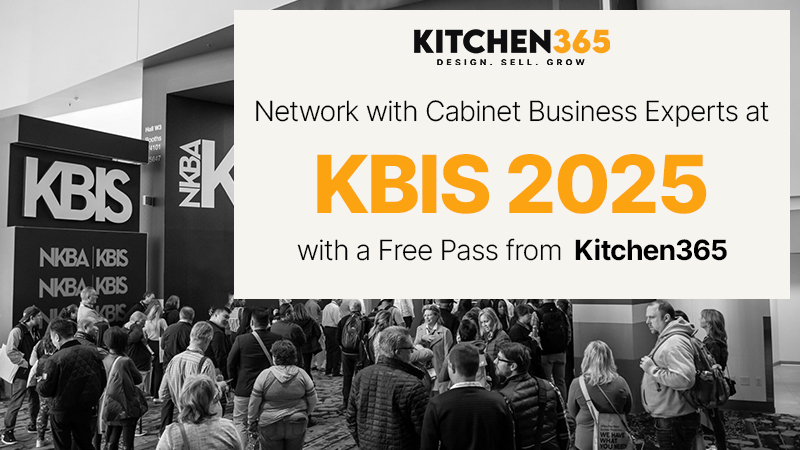

29 Sep AI for Kitchen and Bath Businesses: From Showroom to Installation
AI for Kitchen and Bath Businesses: From Showroom to Installation
AI is already a practical tool that helps businesses streamline operations, enhance client experiences, and boost profitability. From the initial design consultation in the showroom to the final touches of installation, artificial intelligence has the potential to elevate every stage of the process. Let’s explore how AI is reshaping the kitchen and bath industry across three key areas: the showroom, business operations, and the jobsite.
AI is transforming the kitchen and bath industry from showroom to installation. In showrooms, it delivers:
- instant 3D visuals
- personalized design recommendations
- 24/7 client engagement
Behind the scenes, AI automates:
- administrative tasks
- streamlines project management
- improves communication
On the jobsite, it ensures accurate measurements, integrates with innovative products, and supports aging-in-place solutions. Approximately 78% of companies utilize AI technology in 2025.
While AI boosts efficiency and precision, human expertise remains essential; together, they create faster, smarter, and more personalized kitchen and bath experiences.
AI in the Showroom: A New Level of Customer Experience
The most visible impact of AI lies in the design and sales process. Clients used to rely on floor plans, mood boards, or a designer’s words to imagine their future kitchen or bathroom. Today, AI brings these ideas to life with speed and accuracy.
Generate Instant 3D Visuals
AI-powered design platforms can transform a simple photo into a lifelike 3D rendering within minutes. A client can snap a picture of their current kitchen or bathroom, upload it, and instantly see the space reimagined with:
- New layouts
- New materials
- New finishes
This eliminates the guesswork and reduces “decision fatigue,” allowing clients to feel confident about their choices sooner.
For kitchen and bath dealers, this capability speeds up the sales cycle. It can reduce the creation time to just a few minutes. Instead of waiting days for mockups, clients can approve designs in real time.
Offer Personalized Design Recommendations
AI can analyze client data, such as color preferences, lifestyle habits, and budget, to recommend layouts and product pairings that match their exact needs. By linking these recommendations directly to a business’s product catalog, AI ensures that the suggestions are actionable. You can quote, order, and install the products with minimal delays.
Provide 24/7 Engagement
Modern customers expect instant answers. With AI-powered chatbots, kitchen and bath businesses can provide 24/7 engagement. Chatbots can:
- answer FAQs
- qualify leads
- book showroom appointments after hours
This not only improves customer service but also ensures businesses capture potential clients who might otherwise move on to competitors.
AI for Business Operations: Efficiency and Precision
While AI shines in client-facing roles, its impact behind the scenes is just as significant. By streamlining internal workflows, AI allows business owners and teams to focus more on creativity and client relationships.
Automate Tedious Tasks
Administrative work, creating estimates, job descriptions, or project schedules, can eat up valuable time. AI software can handle these repetitive tasks in seconds, producing accurate documents that free up staff for higher-value activities like design consultations and client follow-ups.
For example, AI-powered estimating tools can automatically calculate material costs, labor requirements, and timelines based on project parameters. This not only improves accuracy but also ensures consistency across bids.
Streamline Project Management
Project delays often stem from poor planning or mismanaged inventory. AI’s predictive analytics can forecast material needs, flag potential shortages, and optimize inventory levels. By anticipating demand, businesses can minimize waste, reduce rush orders, and keep projects running on schedule.
For multi-project firms, AI tools also allow managers to track progress across multiple jobs simultaneously, identifying bottlenecks before they escalate. This visibility gives business owners more control over costs and timelines.
Enhance Communication
Clear, timely communication is essential in the kitchen and bath industry. AI can automate personalized email or SMS updates to keep clients informed about their project’s status.
AI can also assist in handling lead intake by screening inquiries and routing calls to the correct department. This makes sure no lead slips through the cracks, and sales teams can prioritize qualified prospects.
AI on the Jobsite: From Measurement to Maintenance
AI isn’t just confined to the showroom or office; it’s transforming what happens in the field as well.
Accurate Measurements
Traditional measurements are prone to human error, which can lead to costly revisions during installation. AI-powered surveying tools and apps use advanced imaging to scan space and generate precise digital models. These models integrate directly into design software, ensuring that what clients see in the showroom matches what’s possible on-site.
Smart Product Integration
AI is increasingly built into the products themselves. Smart appliances, faucets, and fixtures are no longer novelties; they’re becoming standard requests.
- Smart refrigerators can track food inventory, suggest recipes, and send notifications when groceries are running low.
- AI-enabled faucets can recognize voice commands, adjust flow rates, and set water temperature preferences.
- Smart mirrors in bathrooms can display health metrics, daily reminders, or even virtual try-ons for makeup and grooming.
By offering these options, contractors and designers can meet growing homeowner demand for connected, future-ready kitchens and baths.
Aging-in-Place Support
As more homeowners seek to age in place, AI provides innovative solutions that promote safety and independence. For example, motion sensors detect unusual patterns and alert family members or caregivers.
AI-powered lighting systems can adjust brightness automatically, reducing fall risks for seniors. These features give homeowners peace of mind while creating opportunities for businesses to expand into specialized remodeling markets.
Balancing AI with Human Expertise
While AI offers immense advantages, it’s essential to remember that it’s a tool, not a replacement. The most successful kitchen and bath projects will always rely on the expertise of designers, contractors, and installers. AI can:
- accelerate processes
- improve accuracy
- provide data-driven insights
In fact, 48% of businesses leverage AI to maintain accuracy. However, the creativity, empathy, and personal touch of human professionals remain irreplaceable. The real power lies in collaboration! AI handles the technical precision, while humans bring the artistry and problem-solving skills that make every kitchen and bath unique.
Looking Ahead: The Future of AI in Kitchen and Bath
AI adoption in the kitchen and bath industry is still evolving, but the trajectory is clear. As tools become more sophisticated and accessible, smaller firms will benefit just as much as larger enterprises.
We can expect AI to play an even greater role in:
- Sustainability: Optimizing material usage to reduce waste.
- Customization: Generating hyper-personalized designs based on detailed lifestyle data.
- Virtual Collaboration: Enabling real-time, AI-assisted design sessions between clients and designers across different locations.
For businesses, the key takeaway is simple: the sooner you integrate AI into your operations, the more competitive and efficient you’ll become.
Final Thoughts
AI is no longer an abstract concept; it’s a practical asset for kitchen and bath businesses. From showroom design tools that wow clients with instant 3D visuals to operational systems that optimize inventory, scheduling, and communication, AI is transforming every corner of the industry.
On the jobsite, innovative measurement tools and connected products ensure precision and innovation, while AI-driven solutions for aging-in-place add even more value for clients.
By embracing AI thoughtfully and pairing it with human expertise, kitchen and bath businesses can stay ahead of the curve, deliver exceptional client experiences.
Frequently Asked Questions
What is AI, and how is it used in the kitchen and bath industry?
Artificial intelligence refers to technology that can perform tasks that usually require human intelligence. In the kitchen and bath industry, AI is a practical tool used to improve every stage of a project. It can create instant 3D visuals for clients, automate tedious business tasks like generating estimates, and even assist with precise on-site measurements.
How does AI help with the design process?
AI-powered design platforms can quickly turn a simple photo into a realistic 3D rendering. This allows clients to instantly visualize their future space with different layouts, materials, and finishes, helping them make decisions faster and more confidently. Additionally, AI can analyze client data, like budget and style preferences, to suggest personalized design recommendations that are directly linked to a business’s product catalog.
Can AI improve my business operations?
Absolutely. AI can automate repetitive tasks, like creating estimates and project schedules, freeing up staff to focus on more important things like client relationships and design work. It can also help with project management by using predictive analytics to forecast material needs and track progress across multiple jobs.
How does AI affect the jobsite?
AI is not just for the showroom or office; it’s also transforming the jobsite. AI-powered tools can scan a space to generate precise digital models, helping to avoid costly measurement errors. Additionally, many smart products, like faucets and refrigerators, use AI to provide convenience and efficiency for homeowners.
Will AI replace designers, contractors, and other professionals?
No. AI is a tool, not a replacement for human expertise. While AI can handle technical tasks, the creativity, empathy, and personal touch of human professionals remain irreplaceable. The most successful projects happen when AI and human expertise work together.






Sorry, the comment form is closed at this time.